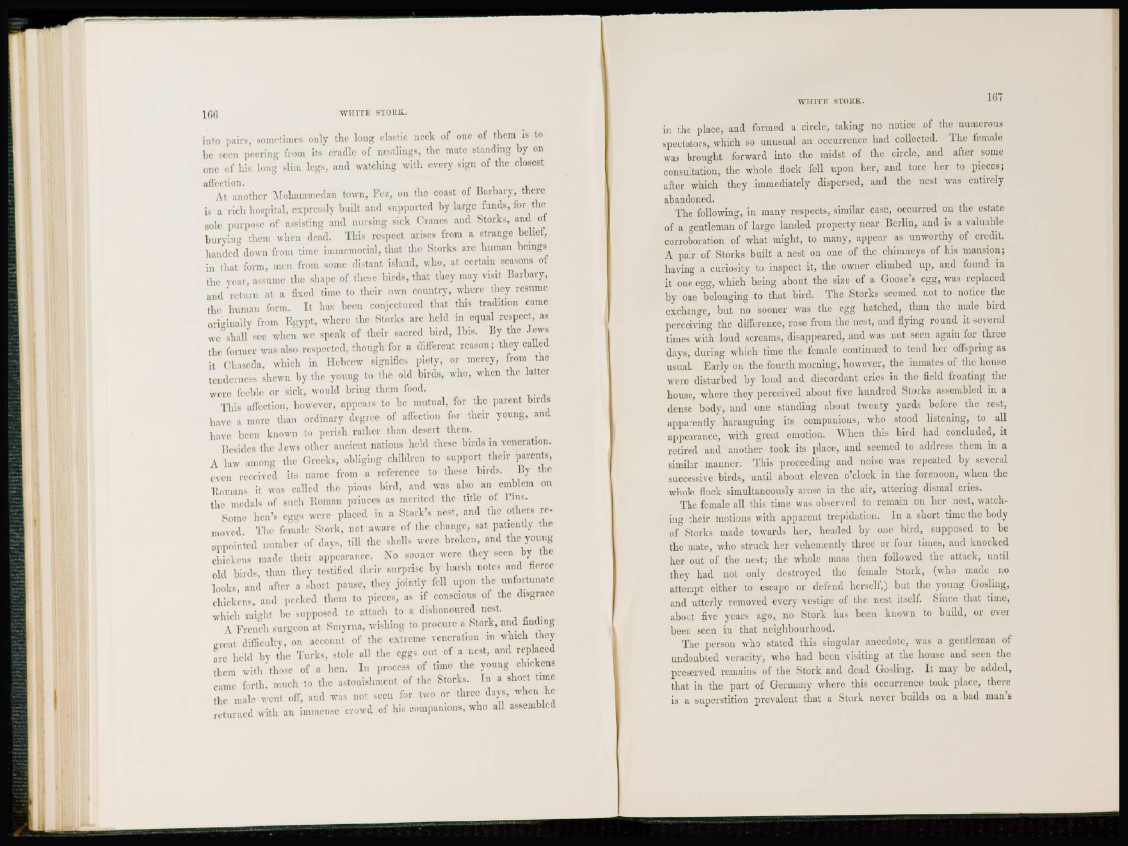
into pairs, sometimes only the long clastic neck of one of them is to
he seen peering from its cradle of nestlings, the mate standing by on
one of his long slim legs, and watching with every sign of the closest
affection.
At another Mohammedan town, Fez, on the coast of Barbary, there
is a rich hospital, expressly built and supported by large funds, for the
sole purpose of assisting and nursing sick Cranes and Storks, and of
burying them when dead1. This respect arises from a strange belief,
handed down from time immemorial, that the Storks are human beings
in that form, nun from some distant island, who, at certain seasons of
the year, assume the shape of these birds, that they may visit Barbary,
and return at a fixed time to their own country, where they resume
the human form. It has been conjectured that this tradition came
originally from Egypt, where the Storks arc held in equal respect, as
we shall see when we speak of their sacred bird, Ibis. By the Jews
the former was also respected, though for a different reason; they called
it Chaseda, which in Hebrew signifies piety, or mercy, from the
tenderness shewn by the young to the old birds, who, when the latter
were feeble or sick, would bring them food.
This affection, however, appears to be mutual, for the parent birds
have a more than ordinary degree of affection for their y-oung, and
have been known to perish rather than desert them.
Besides the -lews other ancient nations held these birds in veneration.
A law among the Greeks, obliging children to support their parents,
even received its name from a reference to these birds. By the
Romans it was called the pious bird, and was also an emblem on
the medals of such Boman princes as merited the title of Pius.
Some lien's egijs were placed in a Stork's nest, and the others removed.
The female Stork, not aware of the change, sat patiently the
appointed number of days, till the shells were broken, and the young
chickens made their appearance. -No sooner -uere they seen by the
old birds, than they testified their surprise by harsh notes and fierce
looks, and after a short pause, they jointly fell upon the unfortunate
chickens, and pecked them to pieces, as if conscious of the disgrace
which might be supposed to attach to a dishonoured nest.
A French surgeon at Smyrna, wishing to procure a Stork, and finding
great difficulty, on account of the extreme veneration in which they
arc held by the Turks, stole all the eggs out of a nest, and replaced
them with those of a lien. In process of time the young chickens
came forth, much to the astonishment of the Storks. In a short time
the male went off, and was not seen for two or three days, when he
returned with an immense crowd of his companions, who all assembled
in the place, and formed a circle, taking no notice of the uuiuerous
spectators, which so unusual an occurrence bad collected. The female
was brought forward into the midst of the circle, and after some
consultation, the whole flock fell upon her, and tore her to pieces;
after which they immediately dispersed, and the nest was entirely
abandoned.
The following, in many respects, similar case, occurred on the estate
of a gentleman of large landed property near Berlin, and is a valuable
corroboration of what might, to many, appear as unworthy of credit.
A pair of Storks built a nest on one of the chimneys of his mansion;
having a curiosity to inspect it, the owner climbed up, and found in
it one egg, which being about the size of a Goose's egg, was replaced
by one belonging to that bird. The Storks seemed not to notice the
exchange, but no sooner was the egg hatched, than the male bird
perceiving the difference, rose from the nest, and flying round it several
times with loud screams, disappeared, and was not seen again for three
days, during which time the female continued to tend her offspring as
usual. Early on the fourth morning, however, the inmates of the house
were disturbed by loud and discordant cries in the field fronting the
house, where they perceived about five hundred Storks assembled in a
dense body, and one standing about twenty yards before the rest,
apparently haranguing its companions, who stood listening, to all
appearance, with great emotion. When this bird had concluded, it
retired and another took its place, and seemed to address them in a
similar manner. This proceeding and noise was repeated by several
successive birds, until about eleven o'clock in the forenoon, when the
wdiole flock simultaneously arose in the air, uttering dismal cries.
The female all tins time was observed to remain on her nest, watching
their motions with apparent trepidation. In a short time the body
of Storks made towards her, headed by one bird, supposed to be
the mate, who struck her vehemently three or four times, and knocked
her out of the nest; the whole mass then followed the attack, until
they had not only destroyed the female Stork, (who made no
attempt either to escape or defend herself',) but the young Gosling,
and utterly removed every vestige of the nest itself. Since that time,
about five years ago, no Stork has been known to build, or ever
been seen in that neighbourhood.
The person who stated this singular anecdote, was a gentleman of
undoubted veracity, who had been visiting at the house and seen the
preserved remains of the Stork and dead Gosling. It may be added,
that in the part of Germany where this occurrence took place, there
is a superstition prevalent that a Stork never builds ou a bad man's